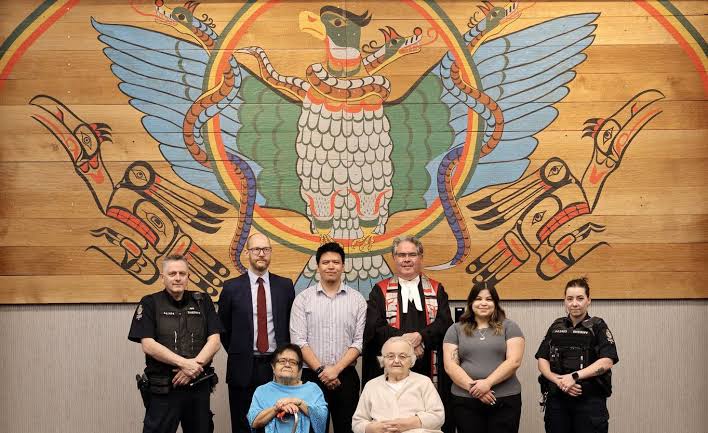Tofino, British Columbia (Rajeev Sharma): In a powerful and unprecedented move, justice in Tofino is no longer confined to cold, distant courtrooms. Instead, it now lives and breathes inside the gymnasium of a former residential school once a symbol of colonial oppression now transformed into a community-driven courtroom led by the Tla-o-qui-aht First Nation.
Earlier this week, Provincial Court Judge Alexander Wolf delivered a sentence to an Indigenous man for assaulting his partner while intoxicated. Yet the hearing was far from typical. The judge did not sit elevated above the accused. There was no intimidating bench, no formal divide. Just ordinary chairs, eye-level dialogue, and the community present victims, elders, families all invited to speak and be heard.
Before court began, an Indigenous elder opened with a prayer. It set a tone not of retribution, but of healing.
“You’ve got a lot of trauma and some of that trauma is not your fault,” Judge Wolf told the man, whose father and grandfather were residential school survivors. “When I send an Indigenous person to jail, I’m mindful there are too many Indigenous people in jail.”
Reclaiming the Past, Reshaping the System
The very space that now holds court once held pain. The Christie Indian Residential School operated from 1900 to 1983, with at least 23 known student deaths. But today, the building converted years ago by the Tla-o-qui-aht into a tourism conference centre now hosts weddings, ceremonies, and, most recently, justice.
To those like Thomas George, who attended the school as a child, the transformation is both powerful and unsettling.
“It still feels eerie,” he said. “Lots of bad things happened here. But now it’s about support, healing, and moving forward.”
George, now 63, serves on the Tla-o-qui-aht justice committee, a group of nine community members guiding people through the legal system. They offer emotional support, help prepare victim impact statements, and even serve tea or coffee to those attending proceedings.
“It’s the little things,” George explained. “It helps people feel like they’re not alone.”
For less severe cases, the committee employs traditional dispute resolution methods such as peacemaking circles, bypassing the formal court altogether in favour of culturally rooted alternatives.
Making Justice Accessible
Dezerae Joseph, also a committee member and women’s project coordinator, has witnessed a significant change. People in the community, she said, are no longer afraid of the legal system. They see it as something they can participate in something that can protect them, not just punish.
“It’s all about relationship building,” Joseph said. “When people know they’ll be heard and supported, they’re more likely to report violence and sexual assault.”
This transformation is part of a broader effort to indigenize the justice system, making it more responsive to the needs and histories of Indigenous communities. Unlike traditional courtrooms, this model gives space to victim voices and community values creating a restorative rather than adversarial environment.
Not a One-Size-Fits-All Model
Kory Wilson, chair of the B.C. First Nations Justice Council, sees the Tla-o-qui-aht’s approach as a beacon of what justice could look like across Indigenous communities each finding a path rooted in its own traditions.
“With nearly 200 First Nations in B.C., every community will have a different way of doing this,” she noted. “There is no one-size-fits-all solution.”
This local innovation coincides with the federal government’s Indigenous Justice Strategy, released earlier this year, which outlines 26 priority actions aimed at addressing systemic racism and overrepresentation of Indigenous people in Canada’s legal system.
Looking to the Future
Currently, the Tla-o-qui-aht Nation has a five-year agreement with the provincial government to hold court in the territory until 2028. But the Nation hopes to make the arrangement permanent.
For Judge Wolf, the hope is more than legal reform it’s cultural and generational healing. As he sentenced the man for assault, he looked beyond the moment, into the future of the family and community.
“I don’t want to sit here in 10 years sentencing a person who beat up your daughter,” Wolf said. “I need you to step up.”
And with that, a sentence was passed not only on the offender, but on the old ways of justice itself.
A Courtroom with a Past: How Tla-o-qui-aht Nation is Rewriting Justice from the Ground Up

